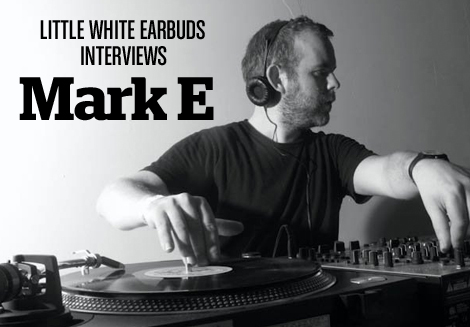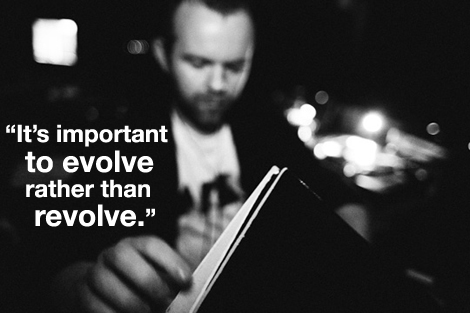
Since 2005, Birmingham producer Mark Evetts has built a career around looped grooves, a uniquely slow, disco-inflected house sound that’s spawned a number of imitators in the process. Many of his productions were largely edit-based, breathing new, warped life into Janet Jackson and Mariah Carey samples to create new cult classics. A diverse range of labels have sought to call his tracks their own, releasing on Golf Channel, Sonar Kollektiv, Running Back, Endless Flight, and Jiscomusic, and compiled them on two compilations for his own MERC imprint. His debut album, Stone Breaker, however, finds that Evett’s style has evolved in favor of a punchier, trackier approach that incorporates more space and less psychedelia, acid cameos and far fewer samples. Its compositions mark a slight left turn for him, outlining his promise as a musician as much as they highlight his preexisting skill as an arranger. With this in mind, LWE interviewed him about the album, its stylistic changes, and his plans for the months ahead.
You’ve kind of spearheaded the whole loopy disco edit trend over the past few years. Obviously Stone Breaker is a departure from that. Did you feel a conscious need to distance yourself from that scene/sound, or was it more of a natural progression?
Mark Evetts: It wasn’t so much a conscious decision to move away from that sound, just a natural progression and development to explore new areas, in both the way I produce and the music I want to play as a DJ. I think if you stay doing one thing for too long it can become boring, not just for the listener, but also for the artist.
Are there any samples on the album?
Yes, there are samples in there, but used subtly.
With something like “Plastic People” or “R&B Drunkie,” you’re obviously working with a preexisting track and creating something new from it. With the new album, were any of these tracks “covers” — I mean, were you applying old methods at all, finding juicy bits in tracks and rather than looping them, emulating them? Or was the composition wholly your own? I ask because a track like “Oranges,” for example, has a similar looping quality.
The composition is all my own. I mean, a track like “Belvide Beat” is a better example of the looping aesthetic, I would say. “Oranges,” on the other hand, is a totally new composition. I wrote the whole track — I think that’s one of the best things I’ve done, because for me it’s a completely original track. I wrote the bass line, the chords, everything, so I’m surprised you draw comparisons with the loopy sample nature of previous tracks. But I understand the direction. I think it’s only natural that I will be employing ways of producing from my previous experiences — it’s just the way I work. But also HOUSE lends itself to the repetitiveness of looping to create a building piece.
Do you find the records from your “edit period” inform your present sound at all? Are you drawing from new influences?
They undoubtedly do, without me even consciously acknowledging it. I think any artist’s previous work will be influencing their current output, and as a producer I think it’s important to take inspiration from new areas — which I think I’m doing all the time, but not only in production. The music I’m buying has changed and matured since then, which [is reflected] in my DJ sets. I’m finding [that] I’m playing a more house-oriented set these days, with techno emerging rather than the disco tinged stuff I was playing a few years ago. I feel it’s important to evolve rather then revolve.

What was the predominant instrumental makeup of the record? Did you acquire any new equipment for it? Because you weren’t solely working with samples, was the search for sounds “wide-open” — there’s acid on a track or two, for instance — or did you feel a need to limit yourself to achieve a cohesive feel?
My setup is very basic, but I can fly through it now. I can get ideas down really fast, so I didn’t see the need to employ anything new for the album. But yeah, the emphasis has now shifted from sample based tracks to pure new sounds and arrangements, something I feel came from doing the edits earlier, they have given me the confidence to try new original music and new ideas.
I read a recent interview where you said you sort of amassed these tracks. Were they all produced in the same period of time, or was it more of a gradual production/accumulation?
I produced the album over about three months of working on-and-off mid last year. It wasn’t meant to be an album, but suddenly they came together and felt right to keep [together] as one… because the chronological flow of how they were produced wasn’t forced, it just happened.
So far, the label MERC has been only you and Chicago Damn. How did you go about finding Chicago Damn, and are you planning to release different artists in the future, or are you keeping it more of a personal/community/small scale thing?
He (Chicago Damn) sent me his tracks out of the blue, and I thought they were perfect for the label so we agreed to put them out. I’m always open to new music from new artists. The next release is by a new artist from the West Midlands called Edward. He sent me some ace music which fits with the ethos of the label. But it [originally] was meant predominantly as an outlet for my own stuff.
What’s coming up for you?
Lots of DJing around the release of the album — a Japan tour, lots of European dates, and hopefully a U.S. tour later on the year. Plus maybe more [releases] with Spectral and lots more on MERC, and I’m working on some new remixes at the moment too.













Very excited to hear the album and glad to hear he is moving on. I wish the interview was a little long but enjoyed it never the less.
[…] LWE chats to MARK E […]
[…] Mark E Little White Earbuds interview […]